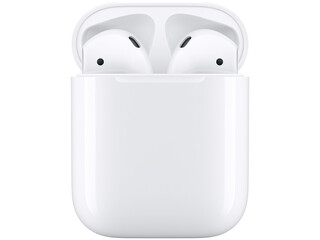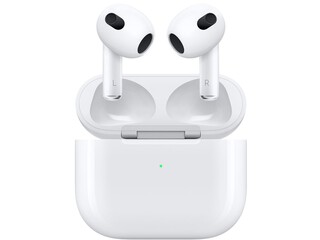AirPods are a popular choice for wireless earbuds, but like all devices with batteries, they won’t last forever. This article will explore how long you can expect your AirPods to function, both in terms of battery life per charge and their overall lifespan, before you may need to consider replacements.
Note: The battery life and lifespan numbers presented in this article are estimates based on real-life usage and our research, designed to provide a general overview of what users might expect from their AirPods under typical conditions.
Table of contents
- AirPods’ battery life and lifespan at a glance
- How long does AirPods (1st gen) last?
- How long does AirPods (2nd gen) last?
- How long does AirPods (3rd gen) last?
- How long does AirPods Pro (1st gen) last?
- How long does AirPods Pro (2nd gen) last?
- How long does AirPods Max last?
- When should you replace your AirPods?
- Conclusion
AirPods’ battery life and lifespan at a glance
| AirPods Model | Battery life | Lifespan | Charging cycles |
|---|---|---|---|
| AirPods (1st gen) | Up to 4.5 hours listening, 3.5 hours talk time | 2-3 years | 300-500 cycles |
| AirPods (2nd gen) | Up to 5 hours listening, 3 hours talk time | 2-3 years | 300-500 cycles |
| AirPods (3rd gen) | Up to 6 hours listening, 4 hours talk time | 2-3 years | 300-500 cycles |
| AirPods Pro (1st gen) | Up to 4.5 hours with ANC | 2-3 years | 300-500 cycles |
| AirPods Pro (2nd gen) | Up to 5 hours without ANC | 2-3 years | 300-500 cycles |
| AirPods Max | Up to 20 hours with ANC and spatial audio | 2-3 years | 300-500 cycles |
How long does AirPods (1st gen) last?
Lifespan
The 1st generation AirPods are expected to last about 2 to 3 years, similar to many devices that utilize lithium-ion batteries. This lifespan is influenced by the number of charge cycles, which range from 300 to 500 for these earbuds.
Battery life
On a single charge, users can enjoy up to 4.5 hours of listening time or up to 3.5 hours of talk time. The charging case extends this by providing multiple additional charges, effectively increasing usage time throughout the day.
How long does AirPods (2nd gen) last?
Lifespan
The 2nd generation AirPods maintain a lifespan of approximately 2 to 3 years, with the capacity to undergo 300 to 500 full charge cycles before the battery performance begins to degrade significantly.
Battery life
These AirPods offer an improved battery life of up to 5 hours for listening and up to 3 hours for talking on a single charge, with the charging case providing extra charges for extended use.
How long does AirPods (3rd gen) last?
Lifespan
Like their predecessors, the AirPods (3rd gen) are designed to last between 2 to 3 years, factoring in the typical 300 to 500 charge cycles that lithium-ion batteries can sustain.
Battery life
The 3rd generation AirPods see a further increase in battery life, providing up to 6 hours of listening time when Spatial Audio is disabled and up to 4 hours of talk time. The included charging case offers additional charges, significantly extending total listening time.
How long does AirPods Pro (1st gen) last?
Lifespan
The lifespan of the 1st generation AirPods Pro is also in the range of 2 to 3 years, with the earbuds supporting 300 to 500 charging cycles over their lifetime.
Battery life
With Active Noise Cancellation (ANC) enabled, these AirPods Pro can last up to 4.5 hours on a single charge. The charging case adds more charges, ensuring that users can enjoy prolonged periods of immersive listening.
How long does AirPods Pro (2nd gen) last?
Lifespan
The 2nd gen AirPods Pro share a similar lifespan of 2 to 3 years to other models in the AirPods lineup, with the ability to endure 300 to 500 charge cycles.
Battery life
When ANC is turned off, the battery life of these earbuds extends to up to 5 hours of listening time on a single charge. The charging case provides additional charges for extended use.
How long does AirPods Max last?
Lifespan
Although specific lifespan details for the AirPods Max are less commonly discussed, it’s reasonable to expect them to last around 2 to 3 years, consistent with other AirPods models, given their similar use of lithium-ion batteries.
Battery life
The AirPods Max stand out with an impressive battery life of up to 20 hours, even with ANC and Spatial Audio features activated, thanks to their larger battery size accommodated by the over-ear design.
When should you replace your AirPods?
While the numbers in the table provide a good benchmark, there are several signs that indicate it might be time to replace your AirPods:
- Significantly reduced battery life: If you find yourself constantly needing to recharge your AirPods, or if they can no longer get you through a reasonable listening session or workday of calls, it’s likely a sign of battery degradation that warrants replacement.
- Sound issues: Whether it’s crackling, distortion, one AirPod being quieter than the other, or a complete lack of sound, problems with the audio quality often suggest internal damage or wear and tear, which is difficult to fix.
- Microphone troubles: If people are struggling to hear you during calls, and you’ve tried cleaning your AirPods to no avail, it’s possible the microphones have deteriorated.
- Features not working: Features like Active Noise Cancellation (ANC) or Transparency Mode in the AirPods Pro may stop functioning as intended with time. If these features are important to you, a malfunction could be a reason to upgrade.
- Upcoming upgrade cycle: If your AirPods are nearing the end of their estimated lifespan, and a new generation with enticing features is on the horizon, it might be the perfect time to upgrade.
👉 Learn more: What To Do With Old AirPods? 5 Smart Solutions
Conclusion
Considering the estimated 2 to 3-year lifespan and the typical 300-500 charging cycles of AirPods, choosing refurbished models can be a savvy option. Refurbished AirPods, which are thoroughly tested and restored to meet original factory specifications, offer a cost-effective way to enjoy them.
On RefurbMe, we provide a platform where you can compare and find refurbished AirPods at a discount and inspected by professional refurbishers, all of them with a warranty. This not only allows you to save money but also contributes to reducing electronic waste, making it an environmentally friendly choice.













